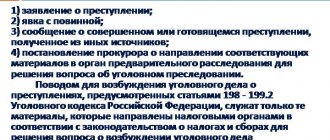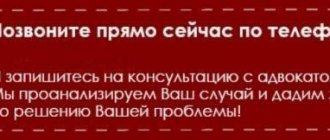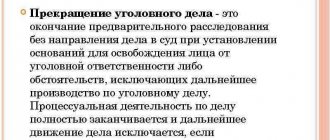I recently studied judicial practice and came across such a case. The woman was attacked by robbers and stole her bag. After the incident, the victim filed a complaint with the police, but the investigator did not open a case, arguing that there was not enough evidence for this. As a result, the woman filed a complaint against the investigator to higher authorities, but this did not yield any results.
Criminal proceedings are a serious process that requires strict adherence to the current procedure. It is necessary to discuss the timing of initiating a criminal case under the Code of Criminal Procedure of the Russian Federation. Even minor violations can lead to refusal to initiate a case. Let's consider how the time limits for initiating a criminal case (UD) are regulated and how these rules are followed by responsible persons.
Grounds for opening a trust
The commencement of proceedings occurs only on legal grounds. These provisions are described in detail in Article 144 of the Code of Criminal Procedure of the Russian Federation. The reasons for establishing a management company may be:
- Reporting a crime. Sent orally or handwritten. The applicant is indicated in the appeal. Anonymous appeals are not considered a reason for prosecution under a criminal article.
- Confession. A person who has broken the law can admit his guilt and report it to the police voluntarily. This is a mitigating point.
- A message about a crime committed or being prepared. Information comes from any sources, then a report is drawn up.
- Prosecutor's resolution on transfer of materials for preliminary investigation. This will resolve the issue of applying criminal penalties.
Criminal cases will not be initiated without justification. Taking into account the cause, the investigation period is set. If there is a guilty person and evidence of illegal acts, the case must be opened within three days. It happens that there is a crime, but there is no evidence. The investigator files a petition to extend the period for conducting the case. After studying the material, higher-ranking officials make a decision to extend the period. This allows us to establish the real circumstances of the unlawful act and bring the truly guilty person to justice.
Who can decide to open
The procedure for initiating a criminal case can be carried out by the following persons:
- the investigator who received information about the crime;
- interrogator;
- bodies of inquiry;
- head of the investigative body;
- world judge.
In each region of the Russian Federation, there are law enforcement agencies that operate both investigative units and departments intended for inquiry. Even the Investigative Committee and the FSB may have investigative departments.
How long does it take for the UD to open?
The standard period for initiating a case under the Code of Criminal Procedure of the Russian Federation in the presence of an application is 3 days from the date of receipt of the application. The period is counted from the moment the applicant is issued a coupon for registration of the application. The receipt is marked with the date, exact time and the investigator who will conduct the case. From this moment the period when the UD must be opened begins.
Within three days, the investigator is required to complete the inspection and make a decision to open a criminal investigation center. If time is required for pre-investigation actions, the period is extended to 10-30 days, but with a sanction. The need arises when investigating tax crimes. Gathering evidence takes time, so the three-day period can be extended to a month. Papers are requested from the Federal Tax Service and other companies.
After the allotted time has expired, the responsible employee will still have to make a decision on whether to initiate a criminal investigation or to refuse it. Sometimes the case is transferred according to jurisdiction. The applicant is notified of the commencement of investigative proceedings in accordance with the established procedure. Once a case is opened, one or more suspects emerge. Without a defendant, the case is postponed.
Excitation procedure
The procedural procedure for initiating a criminal case depends on many factors, which include the identified crime, the article of the Criminal Code under which penalties are assigned, as well as other circumstances of the act. Investigators and interrogators, as a general rule, must work in accordance with the correct sequence of actions , if violated, the decision is often considered illegal.
Important! If violations are detected in the algorithm of actions on the part of the investigator, then the materials obtained during the investigation cannot be used as evidence.
Public accusation
Such a case does not require a statement from the victims, and the process takes place regardless of the wishes of the victims. The features of this process are listed in Art. 20 Code of Criminal Procedure.
For a public accusation, only compelling reasons and evidence are sufficient.
Making a decision
It is formed by the person who accepted the statement about committing a crime. There are some requirements for this document, so the following data must be included in the text:
- place, time and date of initiation of criminal proceedings;
- Full name and position of the person who made the decision to open the case;
- reason and good reasons;
- link to the article of the Criminal Code, which prescribes penalties for violation of the law.
It is possible to initiate a case even if there are no suspects.
Private or private-public affairs
The specifics of such cases are given in Art. 20 Code of Criminal Procedure. To initiate them, a statement is required from the victim or his representative who has a notarized power of attorney.
The features of private-public accusations include:
- proceedings are carried out on a general basis;
- it is impossible to terminate the accusation even if the parties reconcile;
- If there is no statement from the victim, then it is impossible to open a case.
If a stranger entered a person’s apartment and the neighbor reported this to the police, but the owner of the home refused to file a statement, then the case will not be initiated even if there is evidence of a crime.
If, due to a criminal act, damage is caused to the state, then it becomes public. This also includes crimes represented by beatings, fraud, embezzlement or rape.
The specifics of private accusations are given in Art. 115, 116 and 128.1 of the Criminal Code. If a criminal is identified, the case is initiated by the magistrate's court, so the victim sends a statement to the judge at the place where the criminal act was committed.
When drawing up the document, the provisions of Art. 318 Code of Criminal Procedure. Only if all the requirements are met, a case is opened, and the accuser is not the prosecutor, but the prosecutor. If the application does not contain information about the criminal, then the document is not accepted by the judge, but is sent to the law enforcement officer for verification and investigative measures.
Time frame for investigative measures?
The beginning of the criminal investigation occurs on the date of signing the resolution to initiate criminal proceedings. The preliminary investigation begins after the opening of the case. The period lasts about two months, but in some situations the period is extended to 3 months or even up to a year.
After a decision is made to charge the suspect as an accused, the case moves to the next stage - the suspect is charged. Usually after this the citizen is placed in a pre-trial detention center. During the consideration of the case, the accused is given the opportunity to study the case materials and submit the necessary petitions. Only after completion of all standard actions and procedures is the case transferred to the judicial authority. In this instance, a sentence is already passed for the accused person.
“The criminal case was initiated illegally – both on procedural and substantive grounds”
March 7, 2022 6:37 pm
The resolution to initiate a criminal case against Bulat Yumadilov was analyzed by Henry Reznik
On March 6, the President of the Administration of the Republic of Bashkortostan, Bulat Yumadilov, resigned as President of the Administration of the Republic of Bashkortostan and, on the proposal of the new President of the chamber, Artur Nasyrov, was elected its first vice-president. On the same day, it became known that on February 27, 2022, the head of the Investigative Department of the RF IC for the Republic of Bashkortostan had initiated a criminal case on the grounds of Part 1 of Art. 201 of the Criminal Code of the Russian Federation in relation to Bulat Yumadilov. According to the vice-president of the FPA RF, the chairman of the Commission of the Council of the FPA RF for the protection of the rights of lawyers, the first vice-president of the Moscow Administrative Office Henry Reznik, the real reason for initiating a criminal case in the obvious absence of the signs necessary for public criminal prosecution is “public outcry”, in as a result of which the rule of law retreated “before the noisy pressure of aggressive demagoguery.”
As previously reported, on March 6, the President of the Administration of the Republic of Bashkortostan, Bulat Yumadilov, addressed the Council of the Chamber with a statement to relieve him of his position.
By a majority of votes, the Council of the Administrative Board supported the decision of Bulat Yumadilov, and then, by secret ballot on an alternative basis, a new head of the chamber was elected - he became the head of the Uchalinsky district branch of the Bashkir Republican College of Lawyers, a member of the Council of the Administrative Board of the Republic of Bashkortostan, Artur Nasyrov.
The elected president of the chamber, Artur Nasyrov, addressed the members of the Council of the Chamber of Lawyers of the Republic of Belarus with a proposal to elect Bulat Yumadilov as vice-president of the Chamber of Lawyers, with the assignment of the duties of first vice-president to him. The Council of the Administration of the Republic of Belarus supported this proposal.
Criminal proceedings
Meanwhile, as reported by AG, on February 27, the head of the Investigative Committee of the Russian Federation for the Republic of Bashkortostan, Denis Chernyatyev, signed a resolution to initiate a criminal case against Bulat Yumadilov on the grounds of a crime under Part 1 of Art. 201 “Abuse of power” of the Criminal Code of the Russian Federation (the document is available from “AG”).
The charges are based on the circumstances of the conclusion by the Administration of the Republic of Bashkortostan of two lease agreements for premises approved by the Council of the Administration of the Republic of Belarus (in 2014 and 2016), providing for a rental amount that, in the opinion of the Investigative Committee, exceeds the market average, while these premises belong to the mother of Bulat Yumadilov’s wife.
According to the investigation, “the deliberate actions of Yumadilov B.G. “substantial harm has been caused to the rights and legitimate interests of citizens who are members of the Bar Association of the Republic of Belarus.” The resolution also states that he “knowingly knowing that in accordance with the requirements of Part 3 of Art. 27 of the Law “On Non-Profit Organizations”, he is obliged to inform about the existence of his interest in the transaction to the management body of the non-profit organization or the supervisory body over its activities before the decision is made to conclude a transaction, and the interested party transaction itself must be approved by the management body of the non-profit organization or the supervisory body its activities, deliberately concealed information about his personal interest in completing a transaction in connection with the ownership of the property by his relative, and also concealed information about the technical characteristics of the premises, its unsuitability for housing the apparatus of the Chamber of Lawyers of the Republic of Belarus and the need for repairs, the inflated cost of rent compared to average market price and the possibility of renting other, prepared premises for a lower rent. Misled members of the Council of the Chamber of Lawyers of the Republic of Belarus, trusting Yumadilov B.G. as the President of the Chamber of Lawyers of the Republic of Belarus, we decided to approve the conclusion of <…> the lease agreement for the above premises.”
The resolution further states that the actions of Bulat Yumadilov “negatively affected the normal work and led to destabilization of the activities of the Chamber of Lawyers of the Republic of Belarus, caused a public outcry and caused a significant number of appeals from members of the Chamber of Lawyers of the Republic of Belarus to the media, law enforcement agencies and government bodies.”
“As a result of the actions of Yumadilov B.G. by arbitrarily disposing of the property of the Chamber of Lawyers of the Republic of Belarus in his own selfish interests, bypassing the procedures provided for by law and as a result of the formation in society of an opinion that does not comply with the law that the head of the Chamber of Lawyers can make transactions bypassing the requirements of the law, significant harm was caused to the interests of society protected by law and state in the form of undermining the authority of the legal profession as an institution of civil society intended to provide citizens with qualified legal assistance, the activities of which should be based on the principle of legality,” the resolution states.
It is indicated that the preliminary investigation of the case has been entrusted to the second department for the investigation of particularly important cases of the Investigative Directorate of the Investigative Committee of the Russian Federation for the Republic of Belarus.
It was not possible to promptly get a comment from Bulat Yumadilov or his defender “AG”.
In a comment to the press service of the FPA RF, Artur Nasyrov called the initiation of a criminal case against Bulat Yumadilov absolutely illegal. In his opinion, this is an invasion of the independence of the legal community and its self-government. Artur Nasyrov recalled that the Council of the Administration of the Republic of Belarus had previously repeatedly confirmed the validity of the transactions indicated in the resolution to initiate a criminal case; it was also confirmed by the conference of lawyers of the Republic of Bashkortostan.
The elected president of the Administration of the Republic of Bashkortostan reported that the Council of the Chamber and the Conference of Lawyers of the Republic of Bashkortostan, that is, the bodies of the legal community authorized to express the opinion of lawyers in the region, declared disagreement with the initiation of a criminal case under Art. 201 of the Criminal Code of the Russian Federation and on the inadmissibility of interference in the economic activities of the legal profession, operating on the basis of the principles of independence, corporatism and self-government. This position, according to Artur Nasyrov, remains unchanged and the Council of the Administration of the Republic of Belarus will seek to recognize the decision to initiate a criminal case as illegal.
Initiating a criminal case is illegal
Especially for AG, the decision to initiate a criminal case against Bulat Yumadilov was analyzed by the vice-president of the FPA RF, the chairman of the Commission of the Council of the FPA RF for the protection of the rights of lawyers, the first vice-president of the Moscow AP, Henry Reznik. He came to the conclusion that “the criminal case was initiated illegally – both on procedural and substantive grounds.”
“In accordance with Art. 23 of the Code of Criminal Procedure of the Russian Federation, if abuse of power by a person performing managerial functions in a commercial or other organization causes harm exclusively to this organization, then a criminal case on the grounds of Art. 201 of the Criminal Code of the Russian Federation is initiated only upon the application of the head of this organization or with his consent.
The head of an organization is understood as the executive body of a legal entity that carries out its current activities. By virtue of the Law, it can be either collective or individual. In the legal profession it is collective. This is the Council of the Regional Bar Association. In this case, the Administration of the Republic of Bashkortostan, who did not give consent to initiate a criminal case.
The procedural prohibition established by Art. 23 of the Code of Criminal Procedure of the Russian Federation, the preliminary investigation overcomes, seeing the actions of Bulat Yumadilov causing harm to the rights and legitimate interests of citizens, as well as society and the state.
I’ll say it straight: an attempt to adjust the actions of the president (now ex) of the Administration of the Republic of Belarus to the text of Part 1 of Art. 201 of the Criminal Code of the Russian Federation clearly failed. This provision provides for criminal liability of a manager when the harm caused by his actions goes beyond the interests of the organization and is inflicted on citizens in any way connected with it. What kind of third-party citizens are these - perhaps clients who received legal assistance from the lawyers of the AP RB?
And here is the first surprise: it turns out that these citizens are lawyers themselves, members of the Bashkir Chamber. But literally in the previous paragraph of the investigative resolution it is indicated that the same actions of Yumadilov caused harm to the Bar Chamber of the Republic of Belarus. Meanwhile, the regional AP consists of lawyers and is based on their mandatory membership. The lawyers themselves, through elected bodies of self-government - a meeting, a conference, a Council - decide by a majority vote all issues of the financial and economic activities of the chamber. Possible negative consequences of decisions made and approved by the AP bodies do not go beyond the scope of internal corporate interests and cannot lead to the initiation of a criminal case without the consent of the AP Council. Attempts to turn lawyers into ordinary citizens, to take their interests outside the professional community, to separate them from the interests of the chamber of which they are members are nothing more than a trick to circumvent the requirements of the criminal procedure law.
The decision to initiate a criminal case also indicates such provisions as provided for in Art. 201 of the Criminal Code of the Russian Federation signs of a crime, such as causing harm to the interests of society and the state protected by law. This harm, according to the resolution, was caused “in the form of undermining the authority of the legal profession as an institution of civil society intended to provide citizens with qualified legal assistance.” In light of the very subject of the investigation, which is a dispute over the price of renting premises by the Council of the Administration of the Republic of Belarus, all this artificially whipped-up pathos only causes a feeling of awkwardness.
What is the true reason for the illegal initiation of a criminal case in the obvious absence of the signs of a crime necessary for public criminal prosecution? The answer to this question is given in the resolution itself - “public outcry”, “a significant number of appeals from members of the Chamber of Lawyers of the Republic of Belarus to the media, law enforcement agencies and government authorities.” There is one inaccuracy here - in fact, there were “a significant number of appeals from a small number of members of the Presidential Administration of the Republic of Belarus.” But I'll leave it aside. Before us is the undoubted triumph of “hype” - the retreat of the rule of law before the noisy pressure of aggressive demagoguery. I'm convinced it's temporary. The law should not be perverted under any circumstances.
Now two more words about the very subject of the investigation - the allegedly inflated rental price compared to the market average. It is clear to any trained lawyer that there is no crime here from the very beginning.”
The arguments of the decision to initiate a criminal case contradict the Law on the Bar
In connection with the initiation of a criminal case against Bulat Yumadilov, “AG” turned for comment to the President of the Chamber of Lawyers of the Nizhny Novgorod Region, Nikolai Rogachev, who headed the inspection in the Administration of the Republic of Bashkortostan in connection with the initiation of a criminal case against unidentified persons on suspicion of embezzling funds from the chamber’s budget . The inspection did not reveal any violations then.
Nikolai Rogachev told AG that all the points referred to by the investigation were the subject of study by the commission and every argument of the prosecution is refuted by the documents that it studied. In particular, according to him, it is not clear on what basis the conclusion was made that the Administration of the Republic of Bashkortostan could rent the premises for less money and that the contract price does not correspond to the market price. The ANSP president emphasized that the documents presented to the commission indicated something different. The reference contained in the resolution to the fact that the president of the regional chamber is its sole executive body, which made an independent decision on leasing the building, is also untrue. According to the Law on the Bar, the president is a member of the Council, and not an independent body, said Nikolai Rogachev.
He emphasized that it was the Council of the Administration of the Republic of Bashkortostan that decided to enter into a lease agreement for the building to house the chamber. Nikolai Rogachev recalled that the price of such an agreement, like the price of any other agreement on the market, is determined by its parties and the Council in this case considered this price acceptable. “We have familiarized ourselves with the conclusion of the Audit Commission and the minutes of the conference. The conference essentially approved this deal, accepting all the expenses that the chamber made,” emphasized the president of the PA of the Nizhny Novgorod region.
Nikolai Rogachev drew attention to the fact that all subsequent conferences considered that placing the AP of the Republic of Belarus in this building is a good option: good office space, convenient for the population and lawyers, located close to the center and all institutions with which the chamber interacts. “Not once at the conferences did questions arise related to the fact that one of the lawyers was not satisfied with this. Finally, in 2022, an extraordinary conference, which specifically considered this issue, expressed confidence in the Council of the Chamber,” noted the vice-president of the FPA.
In his opinion, the Investigative Committee, by initiating a criminal case against Bulat Yumadilov, violated the principles of independence, corporatism and self-government of the legal profession. The economic activities of the regional chamber fall under the competence of its council, the decisions of which are checked for compliance with the estimate by the audit commission, and the conference hears the report of the audit commission on the expenditure of funds, explained Nikolai Rogachev. “The self-government bodies of the Bashkir Chamber have never made any comments to the council that this premises is unprofitable or unacceptable,” he emphasized.
According to the president of ANNO, in this case the investigation is interfering in the economic activities of a non-profit organization that is independent of the state and spends its expenses at its own expense.
Nikolai Rogachev was also surprised by the statement that the current situation discredits the legal profession. “A commission consisting of four presidents of the chambers went to the site, studied the documents and did not find any violations in the economic activities of the Administration of the Republic of Belarus, since all relevant decisions were made by the Council and subsequently approved by the conference. At the same time, the Audit Commission did not find any violations,” he concluded.
The investigation is interfering with the activities of legal self-government bodies
Svetlana Volodina, vice-president of the FPA RF, vice-president of the Moscow Region Administration, sees the problem in the fact that “the investigation is interfering with the activities of the bodies of lawyer self-government, in this case, the economic activities.” “Lawyers are rightfully outraged that our colleagues have begun to be held accountable for fees that are higher than the “market average,” she notes. At the same time, she wondered how “the excess of rental costs over the “market average” correlates with common sense.” According to Svetlana Volodina, “the weakening of the bodies of lawyer self-government will lead to the weakening of both the corporation and each member of the legal community.”
Development of technology for interfering in the affairs of the legal profession?
Having analyzed the decision to initiate a case against Bulat Yumadilov, Vice-President of the FPA RF Mikhail Tolcheev drew attention to the fact that the investigation decided to protect the rights of “citizens who are lawyers of the Bar Association of the Republic of Bashkortostan,” although all bodies authorized to represent the opinion of the region’s legal community stated on supporting decisions on renting premises. “It turns out that the fact that the legal profession is an independent and self-governing community does not matter. Since it is necessary to protect the interests of citizens, who are lawyers, the principles of the legal profession can be neglected,” he said.
Mikhail Tolcheev also drew attention to the fact that in addition to approving the agenda and bringing up rent issues at the meeting of the Chamber Council, the former president of the Administration of the Republic of Belarus is also charged with the fact that the scandalization of the situation around the chamber and appeals to investigative authorities and the press “caused a significant public outcry” and thus, “significant harm was caused to the interests of society and the state in the form of undermining the authority of the legal profession as an institution of civil society.”
“For professionals, it is obvious that the reason for initiating a criminal case is not the filing of charges, but only the basis for checking the information available about the signs of a crime. And the fact that the case does not have any special judicial prospects is not even because the investigation operates with vague and vulnerable to prosecution concepts of “average price”, “withheld information”, etc., or that in accordance with the Law on Advocacy and Advocacy in The President of the Russian Federation is not the executive body of the chamber, but because this information (about the discrepancy between the market value, the presence of deception, etc.) has long been refuted. Both within the framework of other investigative proceedings, and internal audits organized by the legal community,” added the vice-president of the FPA.
He suggested that the initiation of this criminal case is aimed at testing the technology of intrusion into the independence of the legal profession, justifying this with the tasks of protecting the rights of citizens and state interests. “Your internal affairs are no longer your business! They represent state interest, and the investigation will try to protect your rights, citizen lawyers, even against your will, without relying on your legal capacity. The depth of such external control will apparently be determined along the way and taking into account the needs and interests of control over the legal profession,” emphasized Mikhail Tolcheev.
Life confirms the rightness of the Congress
Boris Zolotukhin, a member of the Council of the Belgorod Region Administration, believes that the situation with the initiation of this criminal case confirms the correctness of the position of the IX All-Russian Congress of Lawyers, formulated in the Resolution on the observance of legal ethics.
“Oddly enough, the initiation of this criminal case confirms the correctness of the Congress Resolution on the inadmissibility of denunciation of colleagues. The signatories were warned that it was inappropriate to contact our procedural opponents on our internal issues, and about the consequences this could entail. And then it happened. Today the Investigative Committee began to define what “the authority of the legal profession” is, tomorrow it will determine the rules of criminal defense for us,” says Boris Zolotukhin.
SharePrint Direct link to the material:
Share
What could be a violation of deadlines?
Failure to meet deadlines is considered a violation of the law. When an official violates the deadline for opening a police department, the victim has the right to file a complaint against his actions. The appeal is sent to:
- to the court;
- to the superior authorities of the offender;
- to the prosecutor's office.
Based on the results of the inspection, a decision is made against the violator. Usually such a person is brought to criminal liability. In judicial practice, common types of violations are failure to comply with the three-day period for opening a case on a received application.
Deadlines
According to Art. 144 of the Code of Criminal Procedure, an investigator, investigator, prosecutor or other responsible person must make a decision regarding the opening of a criminal case within three days after accepting an application or receiving information about a crime. This period can be extended up to 10 days if there is a reasoned request. In special situations, the period increases to 30 days.
Reference! According to the Code of Criminal Procedure, exceptional circumstances that allow the period to be increased to a month include the need to conduct an examination, check documents, audit or other operational or investigative measures.
What to do if the statute of limitations has expired
Criminals are released from criminal liability if the statute of limitations for a specific crime has expired. According to Art. 78 statute of limitations depends on the severity of the act committed. According to Art. 24 of the Code of Criminal Procedure in such cases it is prohibited to open criminal cases, and if the case is nevertheless initiated, it is terminated.
But even in the presence of such a non-rehabilitating basis, a citizen who acts as a criminal is considered to be held accountable. If he does not admit his guilt, then the case will be investigated on a general basis. But even if a person is found guilty, he is released from punishment.






